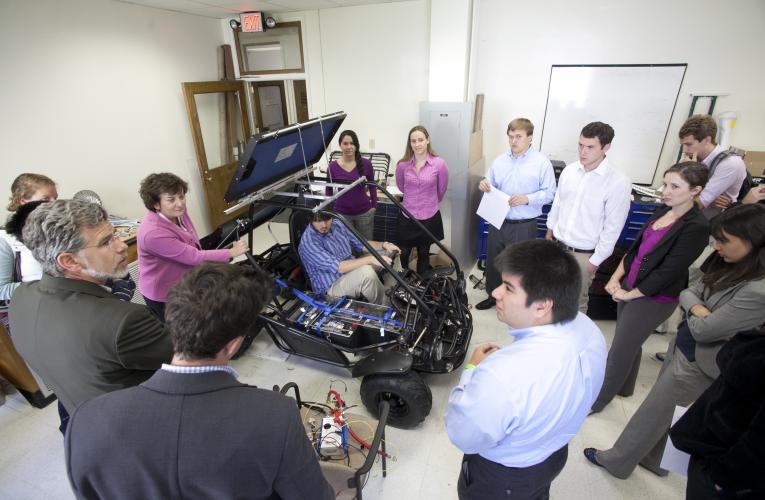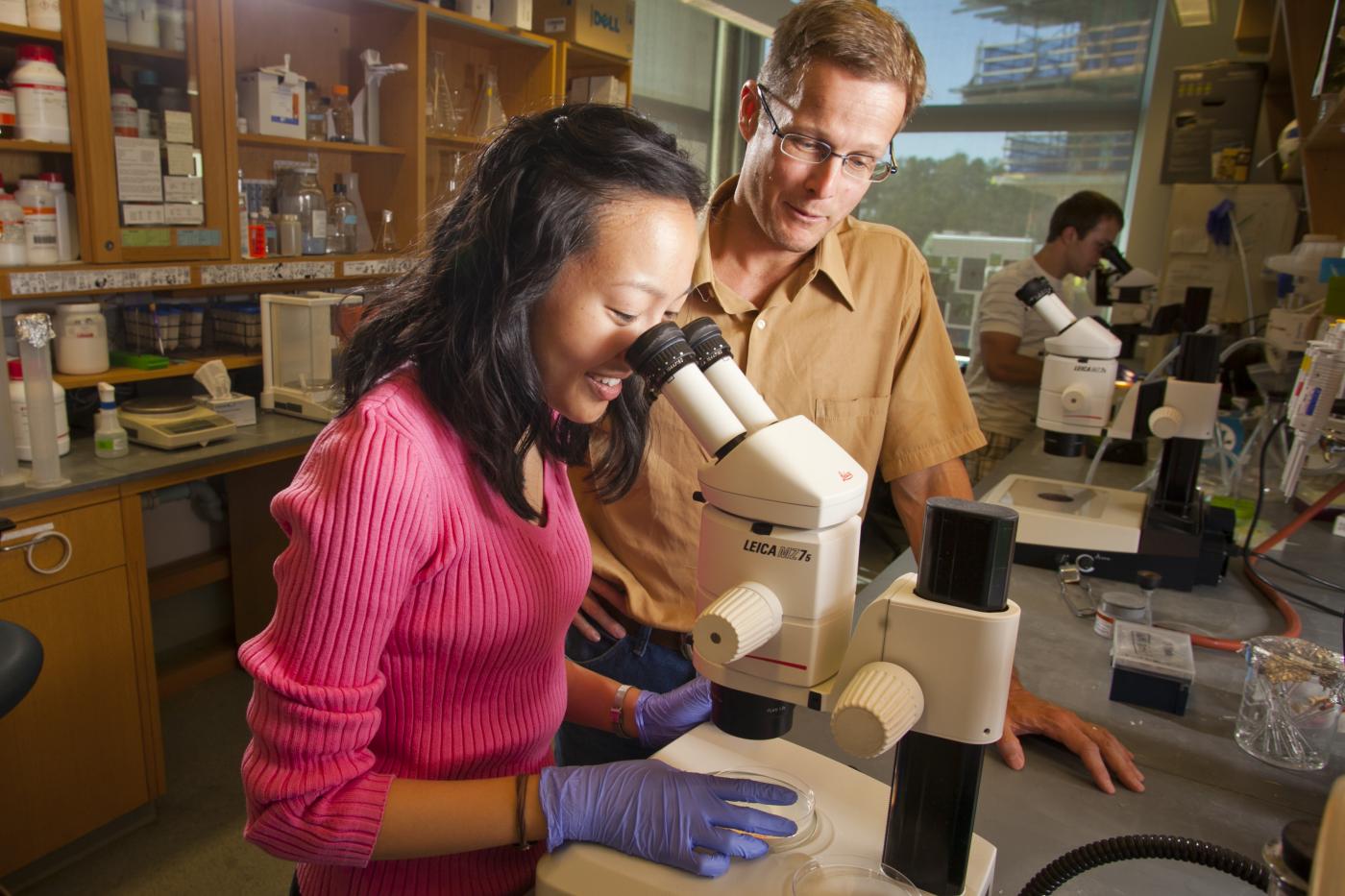Contact: Tim Lucas, 919/613-8084, tdlucas@duke.edu
DURHAM – Tom Schultz, Alex Glass and Chantal Reid hear it every year.
“You’ll be teaching a course and midway through the semester, a student comes to you and says, ‘Why didn’t I know about this class earlier in my time at Duke? It’s given me a whole new perspective’ on energy or climate change or endangered species,” says Reid, an assistant professor of the practice in biology at Duke’s Nicholas School of the Environment.
“You can tell it’s opened new doors for them,” says Glass, a lecturer in earth and ocean sciences. “They’re pumped.”
For Reid, Glass and Schultz – who serve as directors of undergraduate studies at the Nicholas School’s three academic divisions – such responses underscore the value of the courses the school offers for undergrads on Duke’s campus in Durham, at the Duke Marine Lab in Beaufort, N.C., and at Duke Kunshan University in China.
“We have courses that can benefit students in nearly every major, not just those planning careers in the environment or earth and ocean sciences,” says Schultz, director of the Marine Conservation Molecular Facility at the Marine Lab. “There are opportunities here for everyone.”
Undergraduates can select from up to 120 undergraduate courses on a range of timely topics, from “Energy and the Environment” and “U.S. Food Production: What are We Really Eating?” to “Climate Change” and “Sound in the Sea: Introduction to Marine Bioacoustics.”
Most of the courses can be used to fulfill Duke’s requirements for general education competencies. Nearly all of them feature small class sizes, hands-on learning and real-world application.
Some are taught at international field sites such as Baja California, Singapore and Australia.
Many are designed to train students in skill sets – such as the use of drones; remote sensing and geospatial analysis; cutting-edge lab and field-data analysis technologies; or market-driven approaches to natural resource finance – that help young professionals stand out in a competitive job market.
Two increasingly popular career-enhancing options, open to students from any majors, are the multi-course certificate programs in Energy and Environment and Marine Science & Conservation Leadership.
Independent research courses, offered by all three Nicholas School divisions, can be used toward Graduation with Distinction honors. Upper-level undergraduates can also enroll in a number of graduate-level courses each division offers.
“If you’re interested in the policy side of things, there’s a track for that. If you’re interested in the science side, there’s a track for that. And if you want both science and policy, we have that, too,” Reid says. “Any student interested in learning how the natural world works, and humans’ role in it, will find plenty of great options.”
Because each of the school’s three divisions – Marine Science and Conservation, Earth and Ocean Sciences, and Environmental Sciences and Policy – offers courses that, while interdisciplinary in nature, reflect its own unique strengths and focuses, students can choose the options that best fit their interests.
Earth and Ocean Sciences
Low student-to-faculty ratios and a focus on science are the hallmarks of the courses taught by the Division of Earth and Ocean Sciences (EOS), says Glass.
“We’re a small program with small classes, and nearly all our faculty members teach undergraduates,” he says, “so students get to know each other and are guaranteed one-on-one access to their professors.”
Students attracted to EOS courses are primarily attracted to the scientific study of the Earth. “They want to understand the fundamental processes that underlie how the Earth system works and what the implications of this knowledge are – not just for knowledge’s sake, but also to better inform the policies and practices that shape how we manage our planet’s limited resources,” Glass says.
Most EOS majors pursue careers in fields such as geology, atmospheric science, oceanography, water resources, energy, or science education. “They practice or communicate the science that provides answers to real-world problems – such as how to sustainably acquire energy and natural resources to meet society’s growing needs; improve our access to clean drinking water; adapt to and influence future climate change; and reduce pollution, habitat loss and even geopolitical conflict based on earth and environmental resources,” he says.
In recent years, courses on energy and climate change have become increasingly popular.
Another big selling point for EOS courses is the program’s emphasis on hands-on experiential learning, which is enhanced by field trips in nearly every course. For example, the division’s 400-level series of courses include trips to Hawaii to study volcanology and geology, to Yellowstone to study geology and park management, and to the tropics to study climate change impacts on coral reef systems.
“If you are a naturalist at heart, enjoy science and love being outdoors, EOS is a great fit for you,” Glass says.
Environmental Sciences and Policy
The courses and majors offered by the Nicholas School’s Division of Environmental Sciences and Policy (ESP) “are a better fit for students who want training in both science and policy,” says Reid.
“We bring together biological sciences, social sciences and policy so students can explore the most pressing concerns facing society today from a variety of perspectives,” she said. “That said, this does not preclude students from concentrating on one of these disciplines, if that suits their needs and interests.”
Students can select from courses on a wide range of topics, including energy, climate, economics, water, ethics, environmental politics, sustainable food systems, biodiversity and conservation, ecology, environmental toxicology, and environmental impacts on human health. Most courses offer small class sizes, hands-on learning in the local environment, and case studies in which students apply what they are learning to address current real-world problems.
This breadth of options gives students greater opportunity to pursue an individualized track of in-depth study, while still allowing them the flexibility to explore topics they might not have considered otherwise, Reid says.
“When students from other majors ask me why they should take one of our courses, I tell them: You’re at Duke; broaden your horizons and skill sets. Courses taken outside your area of expertise will become useful to you at some point in your career – especially in today’s business climate,” she says. “We live in a world where change is constant. New issues arise every year, and the biggest ones are increasingly connected to the environment. Employers are looking for students with the broad-based, trans-disciplinary skills and understanding needed to capitalize on opportunities and find solutions to the problems. That’s what we teach in our courses.”
The knowledge students glean through the courses can yield lifelong benefits outside the workplace, too, she believes.
“As a conscientious citizen and a member of the Duke community, you want to make educated decisions about the food you eat, the type of car you drive, the way you lead your life. Our courses engage you and can help inform these decisions, so the choices you make are responsible ones,” she says.
Marine Science and Conservation
For undergraduates looking to expand their horizons physically and intellectually, the Duke Marine Lab offers courses with small class sizes and a big emphasis on hands-on learning – in one of the most beautiful natural settings on the East Coast.
“Coming to the Marine Lab for a semester or a summer session can be a life-enriching experience. We hear that all the time from students who come here,” Schultz says.
“One of the biggest draws is the academic community students are immersed in,” he says. “I teach a molecular biology class that typically has between six and 12 students, so I get to know them all and they get to know me. That’s a very different type of interaction than you get in courses with hundreds of students.”
Because the Lab is located on Pivers Island, near the historic coastal village of Beaufort at the southern tip of the Outer Banks, “we offer students opportunities they can’t get in Durham,” he adds. “Students in our biology or zoology classes take kayaks over to Bird Shoal in the morning to collect the specimens they’ll study in the lab that afternoon. Students in conservation, economics or policy courses can collect their data first-hand from local resource managers, scientists, conservationists, fishermen and community members. It’s a tight-knit community, and they become part of it.”
While most students who enroll in courses at the Marine Lab already have an interest in the environment, that’s not a requirement, Schultz emphasizes.
“We offer courses that fulfill Trinity graduation requirements for all majors, and independent study options that span a wide range of disciplines, so coming to the Marine Lab doesn’t mean you’re going to change your career track and become a marine scientist,” he says. “Some students do, but most don’t. But they still have this life-enriching experience. They feel more connected to the marine environment, to the ocean, all through life even if they go on to become a doctor or CPA.”
For more information about the courses, majors and minors the Nicholas School offers, contact Emily Blanchard, program coordinator for undergraduate programs, at undergrad@nicholas.duke.edu or (919) 613-8060.
###



